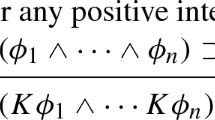Abstract
The Knower Paradox has had a brief but eventful history, and principles of epistemic closure (which say that a subject automatically knows any proposition she knows to be materially implied, or logically entailed, by a proposition she already knows) have been the subject of tremendous debate in epistemic logic and epistemology more generally, especially because the fate of standard arguments for and against skepticism seems to turn on the fate of closure. As far as I can tell, however, no one working in either area has emphasized the result I emphasize in this paper: the Knower Paradox just falsifies even the most widely accepted general principles of epistemic closure. After establishing that result, I discuss five of its more important consequences.
Similar content being viewed by others
REFERENCES
Alston, W. P.: 1989, ‘Justification and Knowledge’, Epistemic Justification: Essays in the Theory of Knowledge, Cornell University Press, Ithaca and London, pp. 172–182.
Anderson, C. A.: 1983, ‘The Paradox of the Knower’, Journal of Philosophy 80, 338–355.
Anderson, C. A.: 1992, ‘Paradox of the Knower’, in Jonathan Dancy and Ernest Sosa (eds.), A Companion to Epistemology, Blackwell, Oxford, pp. 324–326.
Austin, J. L.: 1961, ‘Other Minds’, Philosophical Papers, Oxford University Press, Oxford.
Dretske, F.: 1968, ‘Reasons and Consequences’, Analysis 28, 166–168.
Dretske, F.: 1970, ‘Epistemic Operators’, Journal of Philosophy 67, 1007–1023.
Dretske, F.: 1971, ‘Conclusive Reasons’, Australasian Journal of Philosophy 49, 1–22.
Feldman, R.: 1995, ‘In Defence of Closure’, Philosophical Quarterly 45, 487–499.
Goldstein, L.: 1992, ‘“This Statement is Not True” is Not True’, Analysis 52, 1–5.
Grim, P.: 1988, ‘Truth, Omniscience, and the Knower’, Philosophical Studies 54, 9–41.
Haack, S.: 1978, Philosophy of Logics, Cambridge University Press, Cambridge.
Hales, S. D.: 1995, ‘Epistemic Closure Principles’, Southern Journal of Philosophy 33, 185–201.
Hintikka, J.: 1962, Knowledge and Belief, Cornell University Press, Ithaca, N.Y.
Kaplan, D. and R. Montague: 1960, ‘A Paradox Regained’, Notre Dame Journal of Formal Logic 1, 79–90.
Klein, P.: 1995, ‘Skepticism and Closure: Why the Evil Genius Argument Fails’, Philosophical Topics 23, 213–236.
Luper-Foy, S. (ed.): 1987, The Possibility of Knowledge: Nozick and His Critics, Rowman and Littlefield, Totowa, N.J.
Moore, G. E.: 1959, ‘Certainty’, Philosophical Papers, George Allen and Unwin, London, pp. 227–251.
Nozick, R.: 1981, Philosophical Explanations, Harvard University Press, Cambridge, Mass.
Roth, M. and G. Ross (eds.): 1990, Doubting: Contemporary Perspectives on Skepticism, Kluwer Academic Publishers, Dordrecht.
Stroud, B.: 1984, The Significance of Philosophical Scepticism, Oxford University Press, Oxford.
Author information
Authors and Affiliations
Rights and permissions
About this article
Cite this article
Maitzen, S. The Knower Paradox and Epistemic Closure. Synthese 114, 337–354 (1998). https://doi.org/10.1023/A:1005064624642
Issue Date:
DOI: https://doi.org/10.1023/A:1005064624642



